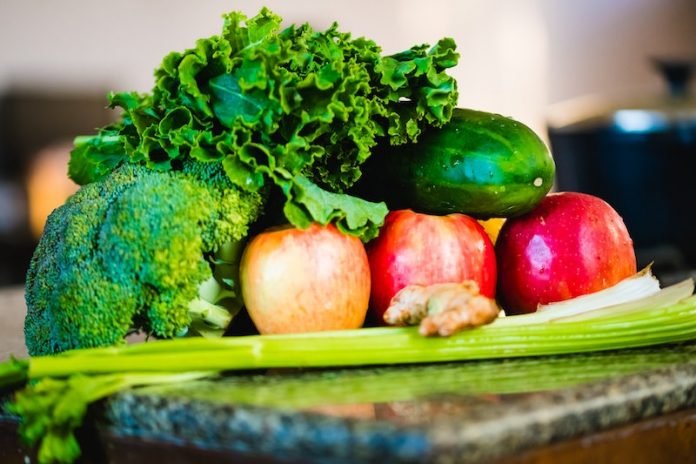
Wearing a face covering, physical distancing, and hand washing are not the only ways that people can protect themselves from COVID-19.
Eating a healthy diet is essential to building a strong immune system so that your body is less susceptible to infection, including the coronavirus, said Carlin Rafie, a registered dietitian and professor in Virginia Tech’s College of Agriculture and Life Sciences.
“Lifestyle does impact your immune function,” said Rafie, whose past research has focused on immune function.
“Having said that, you could be perfectly well nourished and have a healthy diet and still get COVID-19.
What we’re talking about is being proactive in your approach to doing the most that you can to give yourself the best chance to fight it [COVID-19]. Nutrition is one of those things.”
It all starts with changing the public message. Rafie suggests something like “social distance and eat for health.”
She also works with the Virginia Cooperative Extension to help people get access to healthy foods, which has been a challenge for some families during the pandemic.
Rafie offers details about what to do—from eating a balanced diet to adding specific foods—for proper nutrition that strengthens the immune system.
Evaluate your plate
Eat five to nine servings of fruits and vegetables a day, including fresh, canned, or frozen varieties, Rafie said.
“Higher fruit and vegetable consumption is associated with reduced risk of chronic disease and results in lower infection rates,” she said.
Plant-based diets also are best, which include such foods as whole grains, nuts, and seeds. These foods contain healthy fats and provide vitamin E, a vitamin in which people are often deficient.
It’s also important to eat dairy or nondairy alternatives that contain vitamin D every day.
Most vitamin D comes from exposure to sunlight, but during winter’s short days and with people staying at home more, there are fewer opportunities for sunlight.
“We have to be more conscious of our dietary intake of vitamin D,” Rafie said.
She also recommends swapping red meat for white meat, and eating fish at least twice a week.
Fatty fish, such as salmon and trout, “have monounsaturated fats that have an impact on the metabolism in your body that decreases inflammation,” Rafie said.
Vital vitamins and minerals
The majority of people can get all of the required vitamins and minerals in their diet if they choose foods wisely and are conscious eaters.
But there are groups of people who are at risk for nutritional deficiencies, such as older adults. These groups may need to take vitamin and mineral supplements.
In particular, B vitamins, including vitamins B6, folate, and B12, play specific roles in strong immune system function, Rafie said.
Additionally, another vitamin, vitamin C, is an antioxidant.
“We have pretty strong evidence that supplementation with vitamin C during the common cold and respiratory infections actually reduces the severity and length of the illness,” Rafie said.
Also, some older adults are deficient in zinc, a mineral that is important to the immune system. Rafie suggests adding zinc as a supplement if deficiency exists.
Vitamin D has been highlighted in the past year as an important vitamin for fighting coronavirus.
There are receptors for vitamin D in immune cells, Rafie said, and vitamin D’s actions appear to regulate the immune system’s response.
For example, there is evidence that vitamin D deficiency is associated with lung inflammation during a respiratory illness.
Research is ongoing to determine if there are benefits of vitamin D supplementation for people with COVID-19, Rafie said.
Even so, people should be careful not to over supplement with vitamins and minerals. They should consult a doctor to find out if their body is in need of certain nutrients.
Be pro probiotics
About 70 to 80 percent of the immune system is associated with the gastrointestinal or GI tract. That’s why including probiotics, which are good bacteria that keep the gut healthy, in a daily diet is important, Rafie said.
People can find this beneficial bacteria in foods, such as yogurt, buttermilk, and fermented vegetables. Look for live cultures on food labels.
Probiotic supplements are also available.
“The idea of eating in such a way that you have a healthy microbiome [bacteria, viruses, fungi, and other material in the body] is very efficacious,” Rafie said. “It will impact your health, and it will impact your immune system.”
More than food
Exercising regularly and relieving stress also contributes to strong immune systems and better health.
Too often, people believe that the only way that they can defend their bodies against infection is to isolate socially from others.
“Let’s be proactive,” Rafie said. “Stay in your houses but continue physical activity. Also, increased stress suppresses the immune system.
We really have to consciously say that stress is my enemy if I want to fight COVID-19. Exercise regularly and consciously do something daily to reduce your stress and you will impact your immune function.”
Written by Jenny Kincaid Boone.



